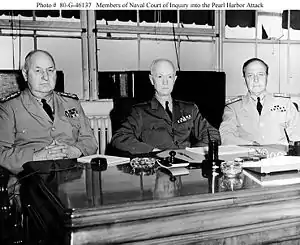Orin G. Murfin
Orin Gould Murfin (April 13, 1876 – October 22, 1956) was an admiral in the United States Navy.
Orin Gould Murfin | |
|---|---|
.jpg.webp) Admiral Murfin circa 1935 | |
| Born | April 13, 1876 Lawrence County, Ohio |
| Died | October 22, 1956 (aged 80) San Diego, California |
| Allegiance | |
| Service/ | |
| Rank | |
| Commands held |
|
| Battles/wars | World War I World War II |
| Awards | Distinguished Service Medal |

Murfin served as the commanding officer of USS Albany in 1916; Concord, 1923–1925; and West Virginia, 1928–29. During World War I, he supervised U.S. mine-laying bases in Scotland, for which he was subsequently awarded the Distinguished Service Medal.[1] From 1931–34, Murfin was the Navy's Judge Advocate General.
He also served as Commander-in-Chief, Asiatic Fleet, 1935–36. From there, Murfin became the commandant of the 14th Naval District, where he led the Navy's participation in the search for Amelia Earhart when her plane went missing in 1937.
Following his retirement, Murfin served as the President of the Navy Court of Inquiry following the attack on Pearl Harbor. The court's conclusions were regarded as too lenient by Secretary of the Navy James V. Forrestal; see Edward C. Kalbfus.
Murfin died on October 22, 1956 and was buried in Fort Rosecrans National Cemetery.[2]
References
- Awarding of Medals in the Naval Service. U.S. Senate Subcommittee on Naval Affairs. 1920. p. 42. Retrieved October 14, 2020.
- "Nationwide Gravesite Locator". National Cemetery Administration. Retrieved January 13, 2020.
External links
| Military offices | ||
|---|---|---|
| Preceded by Frank B. Upham |
Commander-in-Chief, United States Asiatic Fleet 4 October 1935–30 October 1936 |
Succeeded by Harry E. Yarnell |